Why I’m Vegan
February 2007
Totally unexpectedly, I “inherited” ten beautiful chickens of all colors and sizes. They had been left at the house we rented in 1996. I was thrilled! I saw my new chickens as gorgeous, exotic birds—they were sensitive and intelligent, too.
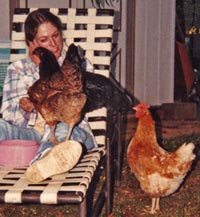
Christine, Rhonda,
Coco & Ralphy.
Having grown up in the suburbs, I didn’t know anything about caring for chickens, so I hurriedly set out to learn everything I could. To my dismay, I found that it was virtually impossible to find any compassionate books about raising chickens. The books I looked at talked about “de-beaking,” and “culling” sick chickens—which means killing them. I was horrified!
I gave up on libraries and bookstores and learned what I could from people at the feed stores in town, and eventually from animal rights literature. I was already a vegetarian, but I became a vegan after my research revealed the sad plight of farmed animals generally. Myths perpetuated about farm animals—that they’re “stupid” or “unfeeling,” or that they don’t experience pain—are simply rationalizations to justify how they’re treated.
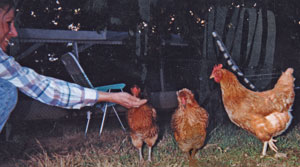
Christine, Rhonda, Honey & Ralphy
My chickens had been neglected by their previous owner, but with care and attention they perked up—their feathers got shiny, and they became curious and friendly. They were thrilled to have the run of the backyard after spending most of their lives in a small coop. They each learned their names and eventually understood as much human language as our dog and cats. Some of the chickens even learned to do tricks—like flying up to roost on my arm or jumping into my lap when I called and motioned to them.
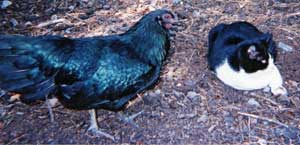
Coco & Shanti
The chickens all had their own distinctive personalities. Some were outgoing and rushed up to meet me when I came outside; others were shy and required some coaxing to come closer. They had close and involved relationships with one another—there were “cliques” and inseparable best friends in the flock. They had a complex system of relationships built around the group’s pecking order, a surprisingly-stable hierarchy of authority. There were power struggles and reconciliations, spats and mutual preening. The chickens also showed visible grief when one of their friends died. For up to three days, they huddled together, uninterested in scratching for food—some even shed tears!
The black chicken, Coco, made friends with our black-and-white cat, Shanti. She would cluck at the cat door for Shanti to come out and play. The two friends sat together on the patio and under the trees. Sometimes they both sat in my lap at the same time!
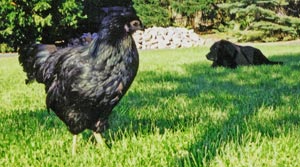
Coco & Darla
All of the chickens bonded with our lab, Darla. They often gathered around her to socialize and preen. Darla seemed amused by the chickens—even when they kicked dirt on her while they were scratching in the soil or taking dust baths. She soon became the chickens’ protector—alerted by their calls of alarm, she chased neighborhood cats out of the yard.
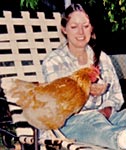
Christine & Ralphy
Their other protector was Ralphy, the number-one chicken in the pecking order. Whenever a hawk flew overhead, she ran to the edge of the flock to put her own body between her charges and the hawk! I found her bravery stunning and deeply moving.
When treated with love, the chickens became tame and trusting. Living in the country, I have observed that other farmed animals—turkeys, ducks cows, pigs, sheep, and goats— also form close bonds with each other and with humans.
Birds, animals, and other living beings have unique personalities, deep feelings, and complex perceptions. They also have their own individual spiritual paths and past-life histories. My experiences with them have shown me, beyond any doubt, that all living beings are “people” in their own right, and all share full spiritual equality with humans.
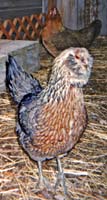
Partridge
& Rhonda
Living beings who are exploited for products or killed for food experience profound emotional, as well as physical suffering. They have lives of unimaginable degradation and misery on factory farms, often even on farms that proclaim that the animals and birds are “free range.” The family farm isn’t much better—birds and animals feel a deep sense of betrayal when their lives are taken by humans they know and trust.

Honey
From a psychic perspective, causing harm to living beings, or being complicit in causing harm through what we buy (regardless of our conscious intention), creates pain for us, too—in our hearts. It also sets back our spiritual evolution. When we eat birds, animals, or fish, we ingest their trauma, fear, and suffering into our body and energy field. The same thing happens when we eat dairy products or eggs.
In an ethical sense, a vegan lifestyle is really a moral imperative—there’s no excuse for causing living beings to suffer and die when so many healthy vegan foods and cruelty-free products are readily available.
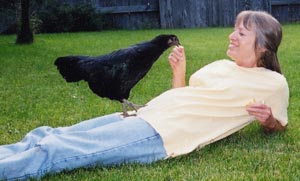
Christine & Coco.
Yes, plants have feelings too, but they don’t have the highly-developed nervous systems that animals, birds, and fish do; nor do they have the individualized self-awareness that registers pain so personally and acutely. Still, it’s important to offer gratitude to the spirits of the plants we eat. This is the deeper reason for saying grace—to express our thanks and to acknowledge the sacredness of all life.
Without the fog of denial, it’s easy to be vegan, because the “personhood” of farmed animals is so clear. And with our eyes open, we can see how adorable they actually are!
The choice of whether or not to eat meat has wider consequences, as well. United Nations scientists have reported that raising animals for meat is a significant contributor to global warming, because farmed animals release a large amount of methane gas into the atmosphere. Also, the increasing need for grazing land is causing massive deforestation all over the world, impeding the planet’s natural ability to offset greenhouse gases in the environment and thereby worsening the global-warming crisis.
Raising livestock for profit creates other serious environmental hazards. Factory farms pollute rivers and streams and spread disease by dumping animal and bird wastes. Furthermore, the antibiotics added to the daily diet of livestock and poultry contribute to the proliferation of antibiotic-resistant bacteria.
The amount of water, grain, and land required to raise animals makes livestock farming an extremely inefficient means of food production. These same resources could feed and financially support far more vegetarians than meat-eaters. In a global sense a widespread reallocation of resources toward vegetarianism could end world hunger once and for all!
You, personally, do have a profound impact on the well-being of the planet and all living beings. Just by choosing to be vegetarian you will save the lives of thousands, maybe even tens of thousands of animals, birds, and fish over the course of your lifetime. As a vegan you will spare many thousands more from terrible suffering. By living a life of harmlessness you make your world a more peaceful, loving, healthy place. We each have the power to make a tremendous difference.
Veganism and the Environment:
Meat-eating, global warming, environmental devastation
Recommended reading:
![]() To Cherish All Life by Roshi Philip Kapleau Copyright © 1981 ISBN: 0-940306-00-X
To Cherish All Life by Roshi Philip Kapleau Copyright © 1981 ISBN: 0-940306-00-X
Animal Liberation by Peter Singer Copyright © 1975 ISBN: 978-0-06-001157-4
THE EMOTIONAL LIVES OF ANIMALS: A Leading Scientist Explores Animal Joy, Sorrow, and Empathy- and Why They Matter by Marc Bekoff Copyright © 2007 ISBN: 978-1-57731-502-5
Links for more information on farm animals:
Animal Place: A Sanctuary and Education Center.
United Poultry Concerns: Farmed Birds and Animal Rights.
Farm Sanctuary: Farmed Animals and Animal Rights.
Getting Started Being Vegan:
The Vegan FAQ: A useful list of frequently asked questions.
Vegan Health: Information on the health benefits and nutrition for a plant-based diet.
Vegan Outreach: Why vegan?
I Can't Believe It's Vegan! A helpful listing of common grocery items that are vegan.
The Veg Blog: Tips for Beginning Vegans: Label Reading.
Back to "Full-Moon Mind" and the Blue Orb.
All material, images, and graphics, Copyright © 2007 Christine Waters.
Permission required for any reprint or reproduction.
All rights reserved.
Website design and Administration by Freeman Waters Computer Services.





